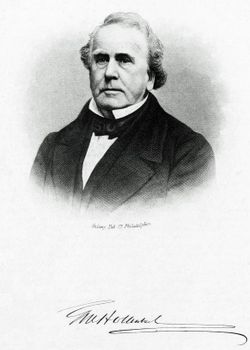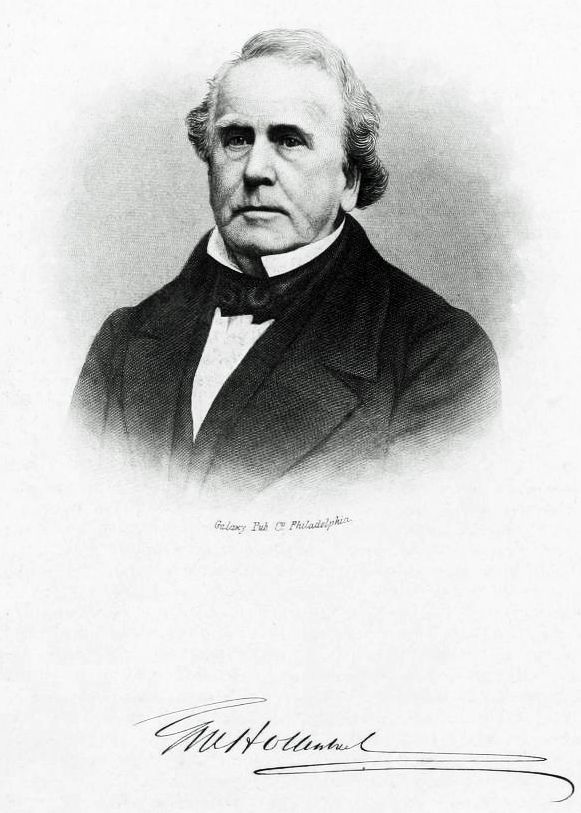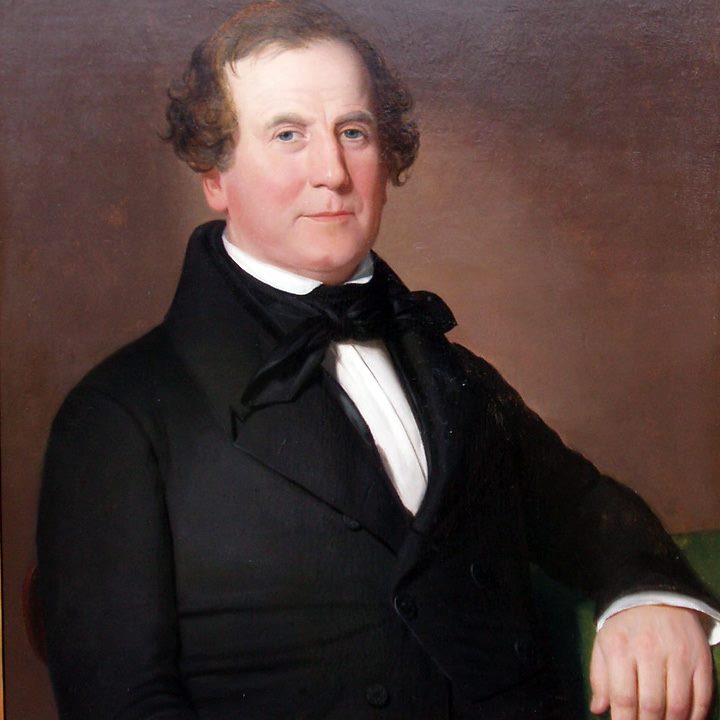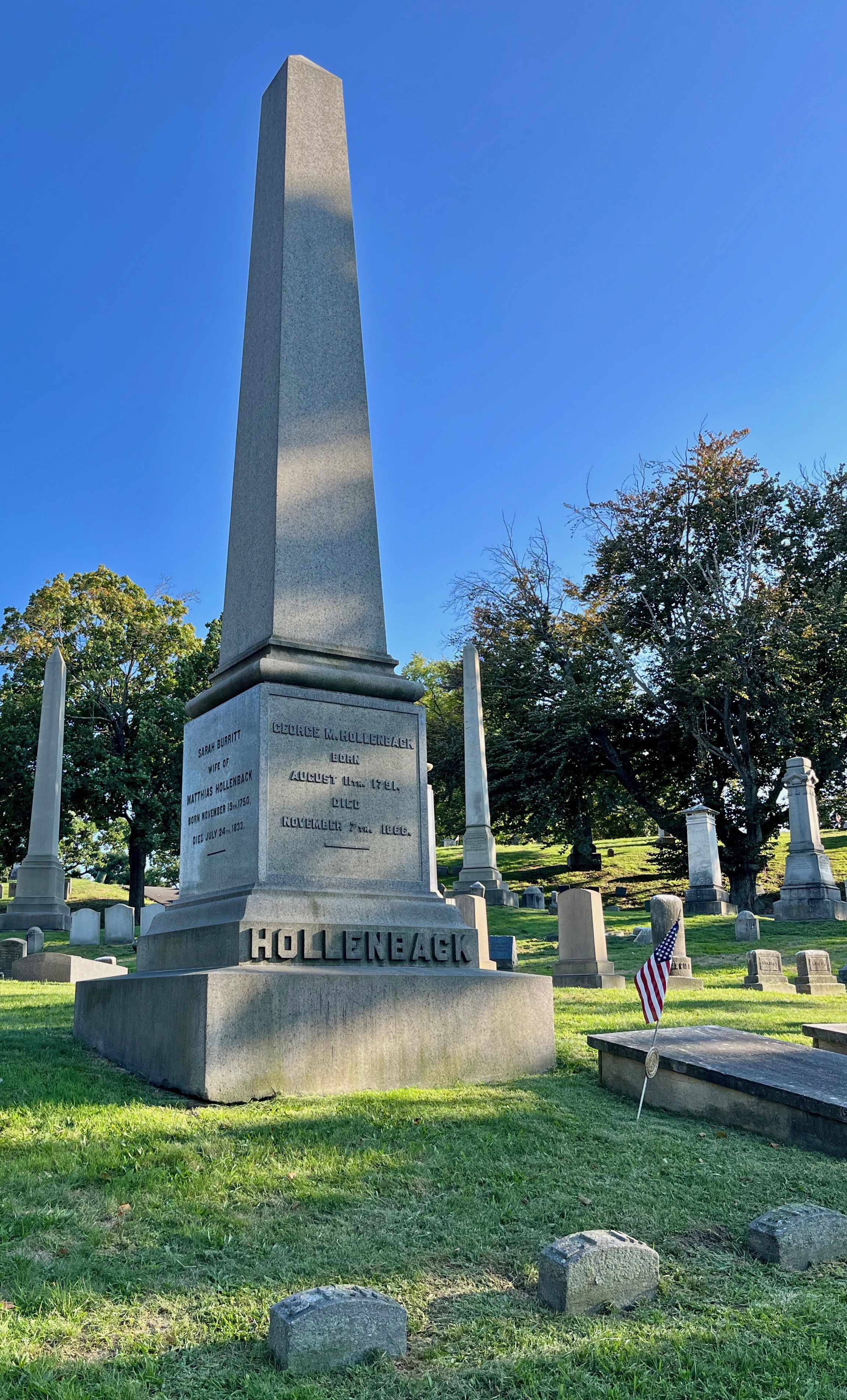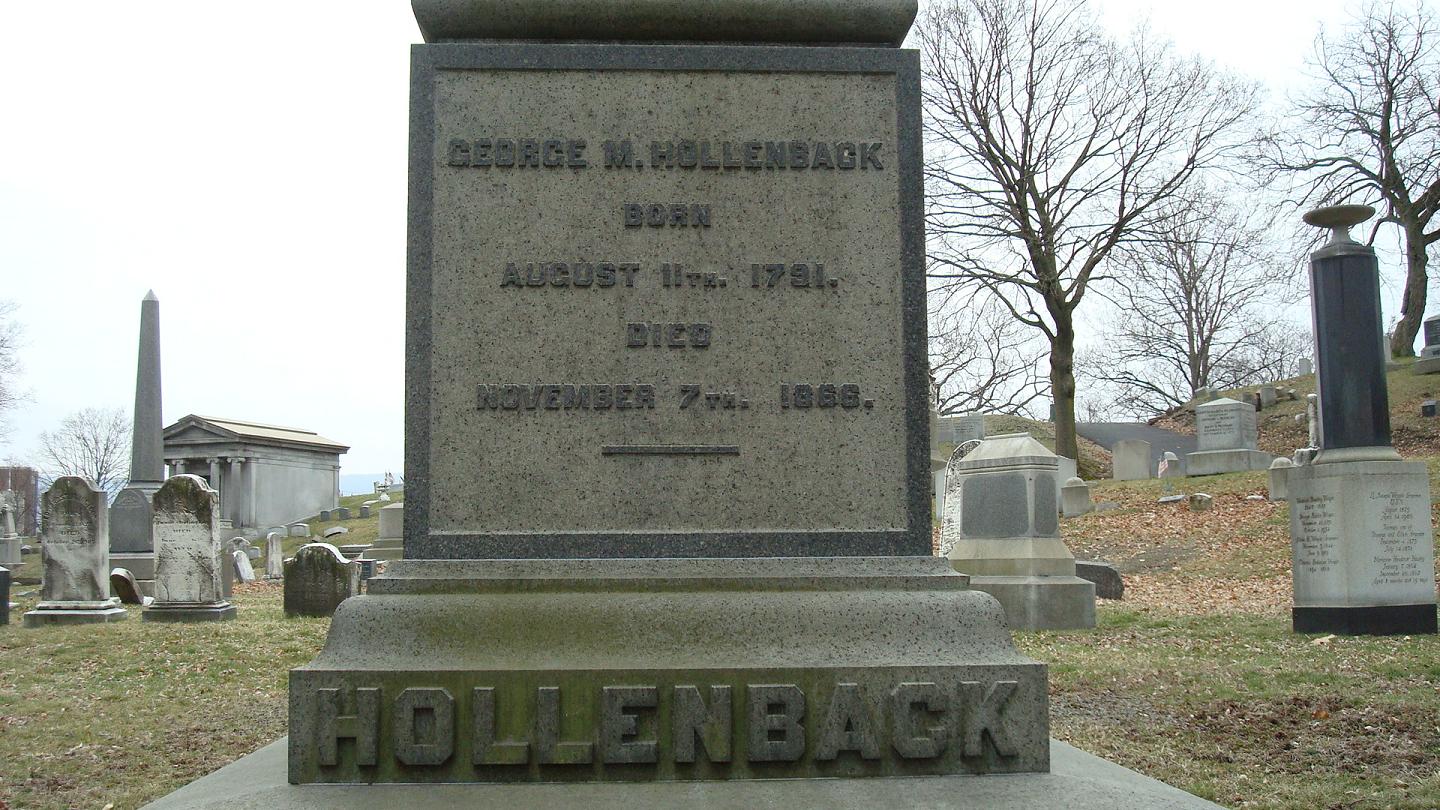Of the number of these young adventurers Judge Hollenback seems to have been the most successful, as during his residence in the valley he accumulated a vast estate in lands, and, at the time of his decease, 1829, he was one of the most wealthy men of the state. George M. was his only son, and after giving him the best education the grammar schools of the county afforded he educated him in the pursuit of his own occupation, that of a merchant, and for many years the father and son conducted and managed one of the most extensive mercantile establishments in the interior of the state. The business embraced the manufacturing of various articles of trade, lumber, flour, paper; and also included agriculture, mining and man)' branches of mechanical industry. So that the house of Matthias Hollenback & Son was the acknowledged head of every business pursuit in northern Pennsylvania. And it was as successful as it was well known. It resulted in an immense estate, and richly rewarded the enterprise and industry of the men who conducted and managed its countless details.
George M., often called Col. Hollenback (having obtained that title as one of Gov. Shunk's aids in 1846), commenced business in his own name about the year 1818. It was at this time that he laid the foundation of the brick edifice for the double purpose of store and dwelling, which is still standing, on the corner of River and Market streets, in the city of Wilkes-Barre. At the remote period when this building was erected it was probably the most costly structure on the Susquehanna north of Harrisburg. A building of this character, eighty years since, was not the work of a few months, for many of the materials were hauled a great distance upon road wagons, and skilled mechanics upon the banks of the Susquehanna were scarce. So the new home was not ready for business and occupation until the month of February, 1820, or about two years after its commencement. At this business stand, with various persons in interest with him, he carried on merchan lizing some thirty years. His own time, however, was mostly devoted to the necessary care of a very large landed estate, as well as other matters which were constantly accumulating. About the year 1820 he served two years as the county treasurer, and the books now in that office show his handwriting upon every page. He was a perfect model of industry, and never availed himself of the assistance of others, if his hours of labor would permit of his doing the work himself.
In 1824 and 1825 he represented the county of Luzerne in the general assembly of the state. This was at the commencement of the system of internal improvements and inland navigation; and, alongside of such men as Dr. Lehman, James Clark, George Wolf, Philander Stevens and Joseph Mclivaine, he devoted every energy of mind and body to the accomplishment of this scheme. And in years after he contributed over a hundred thousand dollars, in cash, to the construction of the junction canal, at the New York line, in order to complete a northern outlet for the north branch Pennsylvania canal. He also subscribed liberally to the Susquehanna canal, to make an outlet to tide-water. The canal system was one of his pets, and he never tired in furnishing money liberally, and bestowed much of his time at the sacrifice of his private affairs.
On the 1st of February, 1842, Gov. Porter appointed him one of the canal commissioners of the state, but his other business affairs would not allow him to hold the commission but a short time. And it was at the pressing solicitation of his friends that he would accept the office for even a temporary season. He was a good merchant, farmer, manufacturer and banker. He was the president of the Wyoming bank at the time of his decease, and had been for thirty odd continuous years preceding. In fact, for nearly half a century the name of Col. Hollenback was connected w.ith all the public affairs of the Wyoming valley. He was in no way a selfish man. It gave him as much real pleasure to witness the success of others as his own. He was ever ready to aid and assist young men in commencing the struggle of life, when he found them worthy; but he had an abhorrence for idleness and dissipation. He was the model business man of the town, as also the example to be imitated in habits of industry, honesty and morality.
He was plain and simple in his manner of life, and furnished a standard of economy in all his expenditures. And notwithstanding he was by far the man of. greatest wealth in his county, the horses which drew his carriage also plowed his fields; his furniture, his apparel, and his mode of living, all exhibited a plain and wholesome frugality—eminently utilitarian in every aspect of life. This sketch cannot be better closed than in the following extracts from an obituary not'ce of Col. Hollenback, written at the time of his decease.
It may be remarked that the lives of the two Hollenbacks. father and son, extend over the entire history of our valley. Both together they have been identified with Wyoming from the time of its first settlement down to the present. In all the eventful progress which reclaimed a savage wild, and made it the glory and boast of a great commonwealth, they bore a distinguished part. Matthias Hollenback was the compeer of our leading men'of the past—Butler, Fell, Welles, Franklin, the Bowmans, Shoemaker, Dorrance, Ross, Catlin, etc. The son links us with the lights of a period less remote. He was the associate of Scott, Denison, Miner, Mallery, Cist, Beaumont, Chapman, Murray, and many others who left their impress upon the community they adorned. In his personal bearing he was always a gentleman. For him the low vices and vulgar indulgences of men had no charm. His salutation, his language, his bow, his cheerful smile, his respectful atten-i tion, were all types of the well-bred man. He was wholly free from the exhibition of ostentation, egotism, and the pride of display. We had no man among us more plain and unpretending. He was a man whose relations with his fellows were characterized by justice and probity, whose friendly intercourse with the community was ever respectful and decorous, whose domestic life passed in strict attention to his business affairs, and the frugal enjoyment of abundance, and whose public career has never been blotted by the pen of censure. A man rich without contumely, elevated in the estimation of his countrymen without indulging the weakness of pride.
GEORGE MATSON HOLLENBACK.
He was married, September 23, 1816, to Emily Lindsley, of Lindsleytown, N. Y.; this lady died in the year 1851,after which he again married. He died suddenly on' the 7th of November, 1866, in his seventy-sixth year, and was buried in the cemetery which bears his own name, and which was the gift to the public of his bounty, leaving no children, but a name unsullied and a large fortune to his kindred.
Of the number of these young adventurers Judge Hollenback seems to have been the most successful, as during his residence in the valley he accumulated a vast estate in lands, and, at the time of his decease, 1829, he was one of the most wealthy men of the state. George M. was his only son, and after giving him the best education the grammar schools of the county afforded he educated him in the pursuit of his own occupation, that of a merchant, and for many years the father and son conducted and managed one of the most extensive mercantile establishments in the interior of the state. The business embraced the manufacturing of various articles of trade, lumber, flour, paper; and also included agriculture, mining and man)' branches of mechanical industry. So that the house of Matthias Hollenback & Son was the acknowledged head of every business pursuit in northern Pennsylvania. And it was as successful as it was well known. It resulted in an immense estate, and richly rewarded the enterprise and industry of the men who conducted and managed its countless details.
George M., often called Col. Hollenback (having obtained that title as one of Gov. Shunk's aids in 1846), commenced business in his own name about the year 1818. It was at this time that he laid the foundation of the brick edifice for the double purpose of store and dwelling, which is still standing, on the corner of River and Market streets, in the city of Wilkes-Barre. At the remote period when this building was erected it was probably the most costly structure on the Susquehanna north of Harrisburg. A building of this character, eighty years since, was not the work of a few months, for many of the materials were hauled a great distance upon road wagons, and skilled mechanics upon the banks of the Susquehanna were scarce. So the new home was not ready for business and occupation until the month of February, 1820, or about two years after its commencement. At this business stand, with various persons in interest with him, he carried on merchan lizing some thirty years. His own time, however, was mostly devoted to the necessary care of a very large landed estate, as well as other matters which were constantly accumulating. About the year 1820 he served two years as the county treasurer, and the books now in that office show his handwriting upon every page. He was a perfect model of industry, and never availed himself of the assistance of others, if his hours of labor would permit of his doing the work himself.
In 1824 and 1825 he represented the county of Luzerne in the general assembly of the state. This was at the commencement of the system of internal improvements and inland navigation; and, alongside of such men as Dr. Lehman, James Clark, George Wolf, Philander Stevens and Joseph Mclivaine, he devoted every energy of mind and body to the accomplishment of this scheme. And in years after he contributed over a hundred thousand dollars, in cash, to the construction of the junction canal, at the New York line, in order to complete a northern outlet for the north branch Pennsylvania canal. He also subscribed liberally to the Susquehanna canal, to make an outlet to tide-water. The canal system was one of his pets, and he never tired in furnishing money liberally, and bestowed much of his time at the sacrifice of his private affairs.
On the 1st of February, 1842, Gov. Porter appointed him one of the canal commissioners of the state, but his other business affairs would not allow him to hold the commission but a short time. And it was at the pressing solicitation of his friends that he would accept the office for even a temporary season. He was a good merchant, farmer, manufacturer and banker. He was the president of the Wyoming bank at the time of his decease, and had been for thirty odd continuous years preceding. In fact, for nearly half a century the name of Col. Hollenback was connected w.ith all the public affairs of the Wyoming valley. He was in no way a selfish man. It gave him as much real pleasure to witness the success of others as his own. He was ever ready to aid and assist young men in commencing the struggle of life, when he found them worthy; but he had an abhorrence for idleness and dissipation. He was the model business man of the town, as also the example to be imitated in habits of industry, honesty and morality.
He was plain and simple in his manner of life, and furnished a standard of economy in all his expenditures. And notwithstanding he was by far the man of. greatest wealth in his county, the horses which drew his carriage also plowed his fields; his furniture, his apparel, and his mode of living, all exhibited a plain and wholesome frugality—eminently utilitarian in every aspect of life. This sketch cannot be better closed than in the following extracts from an obituary not'ce of Col. Hollenback, written at the time of his decease.
It may be remarked that the lives of the two Hollenbacks. father and son, extend over the entire history of our valley. Both together they have been identified with Wyoming from the time of its first settlement down to the present. In all the eventful progress which reclaimed a savage wild, and made it the glory and boast of a great commonwealth, they bore a distinguished part. Matthias Hollenback was the compeer of our leading men'of the past—Butler, Fell, Welles, Franklin, the Bowmans, Shoemaker, Dorrance, Ross, Catlin, etc. The son links us with the lights of a period less remote. He was the associate of Scott, Denison, Miner, Mallery, Cist, Beaumont, Chapman, Murray, and many others who left their impress upon the community they adorned. In his personal bearing he was always a gentleman. For him the low vices and vulgar indulgences of men had no charm. His salutation, his language, his bow, his cheerful smile, his respectful atten-i tion, were all types of the well-bred man. He was wholly free from the exhibition of ostentation, egotism, and the pride of display. We had no man among us more plain and unpretending. He was a man whose relations with his fellows were characterized by justice and probity, whose friendly intercourse with the community was ever respectful and decorous, whose domestic life passed in strict attention to his business affairs, and the frugal enjoyment of abundance, and whose public career has never been blotted by the pen of censure. A man rich without contumely, elevated in the estimation of his countrymen without indulging the weakness of pride.
GEORGE MATSON HOLLENBACK.
He was married, September 23, 1816, to Emily Lindsley, of Lindsleytown, N. Y.; this lady died in the year 1851,after which he again married. He died suddenly on' the 7th of November, 1866, in his seventy-sixth year, and was buried in the cemetery which bears his own name, and which was the gift to the public of his bounty, leaving no children, but a name unsullied and a large fortune to his kindred.
Family Members
Advertisement
Explore more
Sponsored by Ancestry
Advertisement
